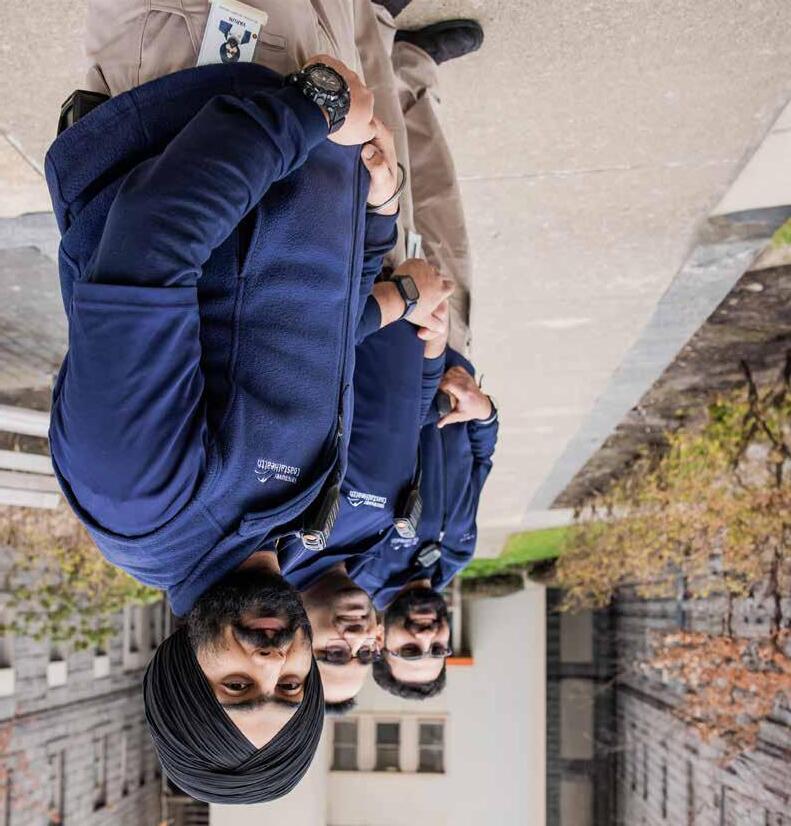
Security officers back in-house in latest move
SPRING 2024 • VOL. 42 • NO. 1 Guardian HOSPITAL EMPLOYEES’ UNION p3
JOB SECURITY
Kim Bellevance PHOTO
FEATURE Premier Eby on health care
David Eby talks about the NDP government’s priorities | 8
NEWS
Job security
Protection services latest group returned to public sector | 3
Making a difference
When HEU members vote, they can have real impact | 7
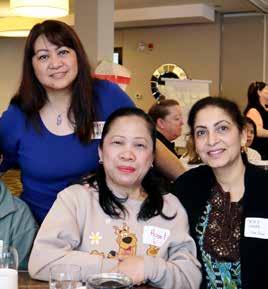

COLUMNS
Viewpoint
Migrant workers deserve rights and equality | 6
President’s Desk
Better health care means hiring, not firing | 6
Getting a move on
Report shows a vision for stronger public transit | 11
Rural program expanded
HEU pushes for retention incentives for more members

CARE CLOSER TO HOME | Improving recruitment and retention for health care staff in rural areas means more people can get the care they need in their own communities.
TO address chronic staffing shortages in health care, the B.C. government has expanded its provincial rural retention incentive (PRRI) program.
The March 1 announcement added 56 communities to the original 15, bringing the total to 74.
“It’s great to see the provincial government take these steps,” says HEU interim secretary-business manager Lynn Bueckert.
“Measures to recruit new staff and retain existing workers helps stabilize health care services and reduces the risk of interruptions.”
The incentive, which applies to members in the Facilities Bargaining Association (FBA), includes $2,000 per quarter to a maximum of $8,000 per year from April 1, 2024 to March 31, 2025.
There’s also a premium for staff travelling more than 40 kilometres to work, and a referral bonus for helping recruit new employees.
When the program first launched in November 2022, it didn’t include HEU members.
But due to the strong advocacy of members in Grand Forks, the government quickly expanded the program to include all frontline health care workers.
But incentives in these 74 communities are still only available to workers in the FBA. About 500 HEU members at eight private or non-profit sites are not eligible.
HEU recently wrote to the Ministry of Health asking them to expand the incentive program to publicly funded long-term care homes in the private and non-profit sectors.
Signing bonuses and incentives are often used by governments as a quick fix to stabilize staff in the health care system.
“While incentives are a welcome attempt to deal with recruitment, we need to address working conditions, wages and hours for all members in the province,” says Bueckert.
Nursing ratios established
At the beginning of March, the government and the BC Nurses’ Union announced an update on nursing ratios.
The ratio program, which was negotiated during the last round of bargaining, will determine the maximum number of patients for each nurse on shift.
This is a first in Canada, but ratios have been shown to improve patient and worker
experiences in Australia and California.
While there’s no specific date for implementation, the province will provide an update in June.
Although HEU supports the ratios, the union also believes this approach should be taken for other workers, like care aides.
“We urge the government to extend this measure to include more members of the health care team so that we can improve working and caring conditions across health care,” says Bueckert.
“In addition to ensuring we
HEU supports nurse to patient ratios, and says this approach should be extended to other workers, like care aides
have appropriate levels of nursing staff in our hospitals and long-term care homes, we ask government to develop similar staffing models for care aides and other team members to further increase the hours of care per resident or patient per day.”
CAELIE FRAMPTON
SPRING 2024 | GUARDIAN 1
Guardian HOSPITAL EMPLOYEES’ UNION SPRING 2024
12 13

COMMENT
Lynn Bueckert | Secretary-Business Manager (Interim)
We have an opportunity to re-elect a government who respects workers, provides them with good, family-supporting jobs, and makes life more affordable and rewarding.
Making HEU voices heard at the ballot box
HEU MEMBERS are a force to be reckoned with.
Over the decades, this union has weathered many storms and emerged stronger each time.
And we look forward to new challenges and opportunities, especially when it comes to the next provincial election on October 19. Because as history has taught our union, elections matter.
Looking back, many members will know that the election of the BC Liberals in 2001 opened a dark chapter for HEU members, with mass privatization, thousands of layoffs and deep wage cuts.
HEU responded with unprecedented campaigns to fight privatization and reorganize health care workers into the union. We also worked hard to make a difference when members voted in the last two provincial elections.
In 2017 and 2020, we elected and re-elected an NDP government who had long-committed to reverse privatization and re-invest in health care. And from this incredible win at the ballot box, HEU’s relationship with the BC NDP helped us build a stronger public health care system with more rights for workers.
But as every HEU member knows, there’s so much more to do.
The next election offers two clear choices.
We know Kevin Falcon’s BC United and John Rustad’s B.C. Conservatives pose a certain threat to the gains we’ve made since the
NDP took power in 2017.
But we can choose to continue building on what we’ve achieved over the last seven years with the BC NDP.
That’s why we need to make sure HEU voices are heard once again at the ballot box this fall.
We have an opportunity to re-elect a government who respects workers, provides them with good, family-supporting jobs, and makes life more affordable and rewarding.
Let’s seize the moment and do it.
Bidding farewell to our former SBM
Earlier this spring, Meena Brisard, HEU’s secretary-business manager for the past three years, announced her departure from the union to spend more time with her family.
Meena helped bring more than 4,000 workers back into the public sector and successfully negotiated a historic facilities contract, including additional resources to address the impact of B.C. Liberal wage cuts two decades ago.
I want to thank Meena for her significant achievements and tireless dedication to HEU’s 60,000 members. We are stronger because of your leadership, Meena.


GIVING WORKING PEOPLE SOME CREDIT
Early credit unions were set up to protect working people from “hard times, financial distress and sickness,” as this 1930s parade float from the Common Good Credit Union proclaims.
It was a time before health insurance or sick days, when being injured on the job meant lost pay, and when getting a credit line at the general store might be the only way to get food on the table.
Many credit unions were founded by labour unions, to give their members fair access to loans, mortgages and financial services they couldn’t get from the banks.
While today’s credit unions are open to everyone, some retain strong ties to their labour roots, offering special packages for union members and supporting union causes.
2 GUARDIAN | SPRING 2024
THROWBACK HEU HISTORY
Image courtesy of SFU Library, Special Collections & Rare Books
NEWS
Your union. Your paper.
Security officers return in-house
Hospital security officers are the latest group to see their contracted-out jobs returned to the public sector
HUNDREDS of hospital security jobs have returned in-house, and an additional 320 new positions have been funded by the BC NDP, to help tackle the growing problem of violence in health care settings.
Protection services was contracted out at most provincial health authorities in 2002. The return of these jobs to the public sector is part of a shift that has seen more than 4,000 privatized workers, mostly in housekeeping and food services, reunited with the health care team.
Now called relational security officers (RSO) with specialized training in trauma-informed intervention, these workers are employed at 26 health authority sites as well as Providence Health Care.
As part of a Labour Adjustment Transfer Agreement (LATA), the formerly privatized security officer jobs have begun moving into the public sector. They’ll be covered by the facilities contract, along with all newly created RSO positions.
The process will be completed by the end of September.
Returning RSOs will have their seniority recognized as part of the transfer agreement.
An additional Memorandum of Agreement was negotiated to recognize seniority for former Paladin Security employees, including those at Northern and Interior health authorities, who are not
YOUR UNION
New fund to cover certification fees
HEU has launched a new program, with funding from the Ministry of Health, to cover costs associated with mandatory courses and certifications for eligible private sector members.
The Education Opportunity and Access Fund covers registration fees for FOODSAFE and First Aid/CPR if it’s a requirement for the member’s job or a health care training program, and the employer does not pay for it.
part of the LATA.
“I was with Paladin until I transferred over to the initial relational security program in September 2023,” says Roland Wing, a relational security supervisor at Vancouver General Hospital (VGH).
“My wages are relatively similar as I was in a managerial role with Paladin. However, there are definitely better benefits and job security now.”
Two decades of privatization
When the BC Liberals (now BC United) passed Bill 29 in 2002, protection services was one of many health jobs privatized.
Protection services officers at Victoria General and Royal Jubilee hospitals on Vancouver Island organized and recertified to join HEU in 2020.
At that time, non-unionized protection services officers at the Comox Valley and Campbell River hospitals on the North Island were also certified by HEU.
Returning to the team
It’s anticipated there will be no jobs lost in this transition. Members are required to have advanced security training before beginning work as an RSO. They have been provided with trauma-informed training and orientation.
Those unsuccessful in qualifying as an RSO can register as casual

|
employees in another department for which they are qualified.
RSOs, covered by the LATA, will select positions from a schedule, based on seniority and employment status.
Previous facilities subsector seniority will be recognized for any officer who worked for a health authority in protection services prior to contracting out.
There will also be a seamless and immediate transition to the Joint Facilities Benefits Trust for employees eligible for health and welfare benefits.
“I was working for a private security company before,” says Sachin,
a VGH relational security supervisor. “But now that I’m working for Vancouver Coastal, I do have job security as an HEU member.
“I’m getting better wages with good benefits compared to private companies, which significantly eases the challenges posed by the current era of inflation. I’m thankful to have such a supportive union to provide guidance.”
 BRENDA WHITEHALL
BRENDA WHITEHALL
First Aid and CPR courses also qualify for a training allowance if they’re taken in-person and require book-off time from work.
A training allowance is not paid when members attend class and work the same day. And because FOODSAFE courses are self-directed online, they do not qualify for a training allowance.
Proof of course payment and completion must be provided. Application forms and detailed criteria are on HEU’s website at heu.org/education-opportunityand-access-fund.
Bursary applications open May 26
HEU offers bursaries ranging from $350 to $1,000 for post-secondary education. HEU members, their spouses and children may apply.
Administered by a bursary committee under the direction of the Provincial Executive, bursaries can be used at any post-secondary institution and are awarded to students who need financial assistance and demonstrate satisfactory academic standing. Applications will be available May 26 at heu.org/bursaries.

Get to know your union
A new information handbook for HEU members is now available through your local, or the HEU website.
Spring 2024 | GUARDIAN 3Sum utat. Natior ata verum ium elit magnisci repel illit, qui rendis aceptiis as re et qui a non repelia
SPRING 2024 | GUARDIAN 3
WELCOME BACK
Relational security officers at Abbotsford Hospital are some of the hundreds of protection services workers now employed directly by health authorities.
Sachin
Ronnie Nicolasora PHOTO
HEU seeks expanded picketing protections
HEU recently took part in a review of the Labour Relations Code (the Code) that was initiated by the Ministry of Labour. The union made several recommendations, such as improving successorship rights, expanding lawful picketing, and addressing gender pay equity.
In B.C., unions are prohibited from picketing at “secondary” sites, including “separate and distinct operations” of the struck employer.
For HEU, the Code’s picketing restrictions mean that if employees of Eden Care Centre, a longterm care facility in Chilliwack, went on strike, they would only be able to form a picket line at their work location.
They could not form a picket line anywhere else, including at any of the nine other long-term care facilities operated by the same employer and represented by HEU, or at the corporate headquarters of the managers or owners of their work site.
The effect of these restrictions is that workers’ freedom of expression is limited more severely than speech by the general population. It also means that strikes are less effective against powerful corporate employers, who can survive a strike more easily because their corporate revenues at their other locations are not affected.
The good news is the labour movement has come together to advocate for a change to these picketing restrictions and demonstrate to the committee of special advisors that these provisions violate workers’ freedoms of expression and association, and they’re unconstitutional.
The review is still ongoing, and HEU will have an opportunity to respond to employer proposals, after which we look forward to receiving the panel’s recommendations.
KAITY COOPER

Standards for all workers Act protects
union and non-union employees
ALL workers in British Columbia have fundamental rights whether or not they’re unionized.
At the core of these rights is the province’s Employment Standards Act.
Health and safety regulations and negotiated collective agreements for unionized employees, or employment contracts for non-unionized workers, also play a key role in regulating policies, procedures and terms of employment.
The Employment Standards Act is the legal framework that establishes and defines workers’ rights in B.C. It covers a comprehensive list of provisions such as minimum wages, standard hours of work, and paid leave (sick/vacation).
The Workers Compensation Act – administered by WorkSafeBC – specifies the rights and responsibilities of employers and workers to ensure workplace health and safety.
This includes requirements for employers to remedy hazardous workplace conditions; provide personal protective equipment (PPE), training and supervision; consult with joint occupational health and safety (JOHS) committees, and investigate incidents.
It also outlines worker responsibilities such as following procedures, using PPE, reporting unsafe work conditions and incidents,
YOUR UNION
As part of our welcome kit for new members, the guide explains how the union works, and information on bargaining, health and safety, resolving workplace disputes, and the union’s history. Download the guide and watch the new video, or order printed copies for your local, at heu.org/ new-members.
Good Sam makes good
HEU members featured on the Fall 2023 Guardian cover ratified their collective agreement with Good Samaritan Canada following their successful job action last
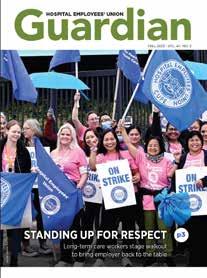
October.
After members at the Delta View site took part in a one-day job action, a tentative renewed collective agreement was reached less than two weeks later, and
was ratified on November 24.
and cooperating with the JOHS committee.
All workers can exercise these occupational health and safety rights: the right to know, right to refuse unsafe work, right to participate, and right to no discrimination.
The Workers Compensation Act also details rules around forming and implementing workplace JOHS committees, and tools for WorkSafeBC to enforce regulations.
WorkSafeBC also protects workers through the Occupational Heath and Safety Regulation, which includes a process for refusing unsafe work; conducting workplace risk assessments; identifying and implementing measures to safeguard workers from potential health and safety hazards, and promoting injury prevention.
In addition to these legislative schemes, collective agreements also contain language around health and safety, work schedules and rotations, wages and benefits, duty-to-accommodate, seniority, job postings and selections, special leave entitlements, discipline and performance evaluations, and a grievance process to address on-the-job issues.
HEU members can contact their local executive, shop steward or servicing representative with questions or concerns.
For more, check out: heu.org/health-safety and heu.org/collective-agreements.
The contract includes renewed contracting-out provisions, improved benefits, and a commitment to maintain current pay rates if wage-levelling in longterm care is ended.
Medical imaging back with home employers
A 2009 scheme by the BC Liberals to dismantle the health care team by consolidating several Lower Mainland services, including medical imaging, has been reversed.
At the time, HEU medical imag-
ing staff working for Providence Health Care, Provincial Health Services Authority and the Fraser Health Authority became employees of the Vancouver Coastal Health Authority.
The move hindered members’ access to onsite union representation, human resources support, union leave, local executive positions, and opportunities to attend convention, conferences and workshops.
“Consolidation was a way to segregate people at work sites and prevent our members from engaging in their local and seeking steward representation,” says
4 GUARDIAN | Fall/Winter 2018
SPRING 2024
IT’S THE LAW
BRENDA WHITEHALL
KNOW YOUR RIGHTS
CLIMATE ACTION
Doing the math on carbon tax
IN a recent survey, HEU members indicated they support the union’s advocacy work promoting climate action.
Reducing the use of fossil fuel, also called carbon-based fuel, is the strongest tool to address the climate crisis. One of the most effective means to do that, according to multiple studies, is putting a price on carbon. In other words, a carbon tax.
Some politicians have called for scrapping the carbon tax, claiming it would put money back in British Columbians’ pockets. To understand what would happen if it was removed, it’s critical to understand what the tax is and how it works.
B.C.’s carbon tax, which has been around since 2008, has two components: the fuel charge, which is applied to gasoline, natural gas and other fossil fuels; and the output-based pricing system, which applies to large industrial emitters.
Here, we’ll talk about the fuel charge, as this is what directly affects HEU members.
The fuel charge puts a price on each tonne of carbon dioxide emitted. As of April 1, the price is $80 per tonne, and is scheduled to increase by $15 per tonne annually until 2030.
An increasing price is meant to reduce fossil fuel demand and encourage the adoption of climatefriendly technologies. Multiple studies have shown the carbon tax has been successful in reducing demand.
The carbon tax adds 17.6 cents to the price of a litre of gas. Driving a Toyota Corolla 20,000 km annually
costs about $260 in carbon tax per year. The more fuel-efficient your vehicle is, the less you pay. If you take transit, bike or walk, you don’t pay the carbon tax.
Similarly, the average Canadian pays about $347 in carbon tax per year if they heat their home with natural gas. If they use electricity or a heat pump, they pay no carbon tax.
Because a carbon tax on its own would impose financial hardship, especially on lower-income households, the provincial government provides rebates.
As of July 2024, a family of four will receive up to $1,008 annually, rising to $1,212 in July 2025. For the vast majority of lower-income and many middle-income households, the rebate exceeds the amount they pay in carbon taxes.
Eliminating the carbon tax would also eliminate the rebate. Lower-income households would have less money in their pockets than with the tax.
Climate impacts are hitting harder and more often. In 2021 alone, 619 people died in the June heat
dome, wildfires destroyed the town of Lytton, and HEU members and patients had to evacuate facilities with little or no notice. Flooding damaged or closed 24 highways around the province.
The cost of these disasters to the provincial government has been estimated at $6.1 to $7.6 billion.
Without the carbon tax, emissions would continue to rise, the climate crisis would continue to deepen, and governments would incur ever-increasing costs paid for by tax dollars.
GREEN DOLLARS | The climate action tax credit is automatically calculated on your annual income tax return and is paid out quarterly. This rebate helps offset the impact of carbon taxes paid by individuals and families, based on their income.

HEU interim secretary-business manager Lynn Bueckert.
But the union recently negotiated a Labour Adjustment Plan to transfer about 800 medical imaging staff back to their home employer, porting their benefits, seniority, and leave banks, under the facilities contract.
They’ll also remain at their current site, with the same job, work schedule and compensation package.
“We have worked hard with the BC NDP government to undo many of the harms the BC Liberals did to public health care and our members,” says Bueckert.
“And while more needs to be done, it’s important we recognize each victory.”
Nominate a member for convention awards
Nominations are open now for
HEU’s 2024 Convention Awards. You can celebrate a co-worker for outstanding contributions to their union, communities or a cause.
Awards are in four categories – social justice, disability rights, Indigenous reconciliation, and the Mary LaPlante Sisterhood Award for promoting non-binary, 2-Spirit or women’s issues.
Awards will be presented onstage at the convention this October.
The deadline to submit nominations is July 23. Nomination forms can be found online at heu.org/ heu-convention-awards-2024.
Bargaining conference dates set for fall
HEU is holding three bargaining conferences this November, to prepare for public sector bargaining in spring 2025.
Members in the Facilities Bargaining Association, the Community Social Services
Bargaining Association and the Community Bargaining Association will be meeting to discuss issues and strategies, and vote on bargaining demands.
Locals elect delegates to represent them at the conferences, and are encouraged to craft and submit their own bargaining demands.
At the conferences, local bargaining demands will be discussed and voted on, and delegates will be elected to serve on the bargaining committees. After the conference, the final package of demands will be established, the bargaining committee will
Fall/Winter 2018 | GUARDIAN 5
SPRING 2024
WORKING FOR YOU
THE ART OF THE DEAL
HEU’s professional bargaining staff support members at the table, employing their strategic skills, legal smarts, and years of negotiating experience. Last year, HEU bargained more than 55 independent collective agreements, 19 of them first agreements for new locals.
Our powerhouse team of Maria, Noel, Jim and Parm, skillfully supported by administrative assistants Macy and Narveen, and guided by HEU’s director of organizing and private sector bargaining Nina Dhillon, are out to achieve the best deals possible for HEU members.
Betty Valenzuela | Financial Secretary
VIEWPOINT

 Barb Nederpel | President
Barb Nederpel | President
PRESIDENT’S DESK
The TFW program creates two sets of workers: one with rights and privileges as Canadians, and one afraid to exercise their rights.
LIKE ME, many HEU members are immigrants to Canada, arriving here with education, work skills and experience, and dreams for a better future.
But it isn’t a smooth road. There’s systemic racism and discrimination. A lack of recognition for professional credentials. Limited opportunities.
And for many migrant workers, a path to citizenship is lacking.
Yet, our economy relies on migrant workers to fill many jobs in numerous sectors. We especially see this in health care where we desperately need more staff.
Temporary foreign workers filling a need
In recent years, there’s been a growing number of long-term care facilities using Canada’s Temporary Foreign Worker (TFW) program to bring workers to this province.
These workers are hired at unionized work sites and covered by a collective agreement, but their immigration status can make them scared to connect to their union.
The ongoing fear of deportation puts migrant workers in a vulnerable position, where they’re at risk of exploitation, unsafe work environments, and abuse.
In regions with housing shortages, some workers depend on their employer not just for their job, but also for the roof over their head.
HEU is aware of more than one employer who provides rooms for TFWs within the facility where they work, while some supply rental accommodations offsite.
But the employer is not obligated to provide housing, so these arrangements can be ended at any time. That’s unfair to workers. Nobody should be afraid at work. Nobody should go home injured. Nobody should be treated differently because of their immigration status.
All workers need the same protections
That’s why we stand up – as a union. In B.C., the number of TFWs and international students working in health care is unknown. But the TFW program creates two sets of workers: one with rights and privileges as Canadians, and one afraid to exercise their rights.
HEU advocates that we must defend the rights of all workers. Migrant workers deserve equality. They deserve permanent resident status. They deserve access to health care.
We all deserve opportunities to build a life with our families here in Canada. To create a home. To be safe. To be treated with dignity and respect. To live our dream.

The focus of all provincial parties should continue to be on hiring – it’s the only way to ensure care will be there when it’s needed.
LATELY , you have probably noticed discussions in the media about B.C.’s budget deficit and concerns raised by some critics about the province’s debt level.
In the end, budgets are all about choices.

And these choices are inevitably about what kind of society we want.
Let’s take a deeper look at the BC NDP government’s record investments in health care, for example.
We know British Columbians want to access health care when they need it. And day in and day out, HEU members work hard to provide the best possible care for patients and residents.
Whatever the B.C. government budgets each year for Medicare has a profound impact on the care patients and residents will receive. It will also shape the working conditions for those delivering the care.
Smaller public service means job cuts
That’s why it’s hardly surprising that the two parties calling for smaller deficits – the B.C. Conservatives and the BC United – are the same ones talking about reducing public services should they form government after the next election. And we all know what that means – less money for health care and job cuts.
Instead of talking about firing, the focus of all provincial parties should continue to be on hiring – it’s the only way to ensure care will be there when it’s needed.
In fact, over the last several years, there’s been a profound shift in B.C.’s approach to Medicare. The BC NDP government is rebuilding the health care system.
The result is better access to care that is making a real difference in people’s lives. But HEU members also know there’s more to do to rebuild our health care system, and Budget 2024 keeps us moving in that direction.
We need to invest in the future
of health care
Overall, when you look at Budget 2024’s deficit, it is projected to be $7.9 billion. Sounds like a big number, right?
But the province’s economy is in great shape.
We have one of the lowest unemployment rates in the country. And our taxpayer-supported debt-to-GDP ratio, a key indicator used by credit-rating agencies when assessing B.C.’s budget, is still below Ontario’s and Quebec’s.
Altogether, this means the 2024 deficit is a practical solution that guarantees we won’t face cuts to health care or other public services.
Instead, British Columbians will get the services they need.
And that is good news for HEU members and their families.

6 GUARDIAN | SPRING 2024
Elaine Littmann PHOTO
Getting out the vote this October
Results show mobilizing union members can have outsized impacts
OCTOBER 19, 2024 is a key date for HEU and its 60,000 members.
On that day, one of the most pivotal provincial elections in the 80-year history of the union takes place. And HEU members will have an important decision to make.
“Over the past seven years, B.C. has been governed by the BC NDP,” says Lynn Bueckert, HEU’s interim secretary-business manager.
“And under this government, there has been a strong effort to reinvest in health care, reversing the 16 years of privatization B.C. experienced under the previous government.
“Since 2017, all the gains HEU has made would not have been possible without the BC NDP government and HEU members fighting for change,” says Bueckert.
But HEU members should not take that progress for granted, added Bueckert. Both the BC United and the B.C. Conservatives have said they’re going to cut health care – and that would undo that progress, making it harder for patients and workers.
The good news is, one in 30 British Columbians have a direct relationship with HEU. They are either a member of the union, the spouse or partner of an HEU member, or a member’s adult child still living at home. And that means HEU members have a lot of influence on who forms the next government in B.C.
That’s why in response to the political opportunities and challenges ahead in this election, the union is re-launching HEU Votes later this spring – a major initiative to engage, educate and encourage members to vote in the fall election.
Studies show that when unions engage members at election time, members will turn out to vote at a higher rate than the general public – as much as 10 per cent higher. Moreover, when union members are mobilized to vote, this mobilizes voters beyond the union’s membership.
YOUR UNION
convene, and then dates will be set to meet with the employer.
If you want to know more about how it works, check out the “Introduction to Bargaining” booklet included with this Guardian
The Community Social Services Bargaining Conference will be November 6 and 7. The Community Health conference meets November 13 and 14. And the Facilities Bargaining Conference will be November 19 – 21.
Stay in touch with your local executive for more details and deadlines.
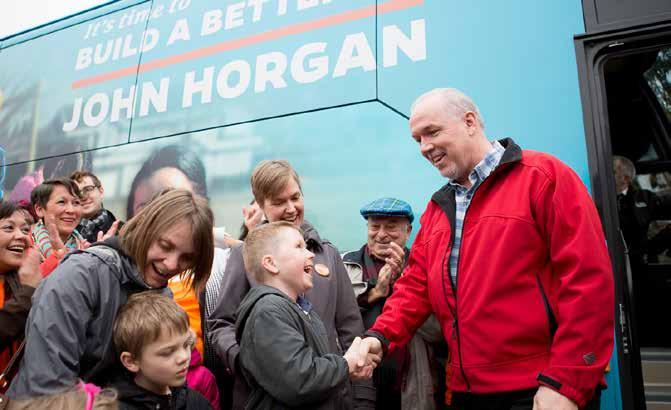
“The last time our union engaged members on this scale was in the 2017 B.C. election when one out of three members said HEU’s work contributed to their decision to vote for the BC NDP,” says HEU financial secretary Betty Valenzuela. “In the Courtenay-Comox electoral district, where the BC NDP only won by 189 votes, HEU mobilized nearly 300 members and their families – more than the margin of victory in a seat that was key to ending the BC Liberals’ 16-year rule.”
Taken together, the work of HEU and other unions at election time can greatly impact the overall democratic life of our province. So, it’s not surprising that a strong majority of HEU members said they support the union’s involve-
Welcome new members
The union welcomes 200 new members who made HEU their union of choice since last December.
HEU now represents workers at CareCorp at Shaughnessy Care Centre and Granville Gardens in Vancouver, CareCorp at Lynn Valley Care Centre in North Van, and Horizon House in Richmond.
These new members work in a variety of jobs in long-term care, support services, assisted and independent living, and mental health support.
ment in elections, according to a recent poll completed this past March.
“After the next election, we can build on what we’ve achieved since 2017, working with – and when needed – pushing the government to do better,” says Barb Nederpel, HEU’s president.
“We have a chance to turn our vision of public health care into a reality,” says Nederpel, “where all health care workers can hold down good family-supporting jobs that they find fulfilling.
“It’s a once-in-a-generation chance to help build a truly world-leading public health care system, one that will be the envy of the rest of Canada. Let’s do it.”
NEIL MONCKTON
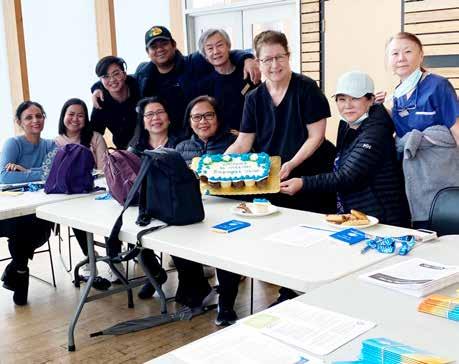
SPRING 2024 | GUARDIAN 7
PROVINCIAL ELECTION
SMALL BUT MIGHTY | In a tight race during the 2017 provincial election, the 675 HEU members and their families in Courtenay-Comox may have made all the difference.
P5
A GREAT START | HEU members working for CareCorp at Lynn Valley Care Centre celebrate their first local meeting.
Marie Pantelis PHOTO

Premier Eby’s hopes for health care workers
B.C. Premier David Eby won his first term as an MLA in 2013, in his riding of Vancouver-Point Grey. He was appointed Attorney-General following the 2017 NDP election win, and in 2020 was also named Minister of Housing.
A lawyer and longtime civil rights advocate, Eby became NDP leader and premier in 2022 after former leader John Horgan resigned for health reasons. Eby will lead the party into the provincial election this October.
The Guardian sat down with Premier Eby to talk about what his government is doing to improve B.C.’s health care system, and his vision for the future of the province.
How do you think your personal experiences shape how you see health care in B.C. and how it should be delivered?
My partner is a health care professional who started her career as a nurse and is now a family doctor. Through her, and through my conversations with other critical health care workers like HEU members, I’ve broadened my perspective how health care is delivered to British Columbians.
A properly supported public health care system doesn’t start when you’re at the hospital door and end when you leave. Ideally, our system incorporates supports like housing, long-term care, mental health resources, and so on. We are trying more and more to meet people where they are at with their health care with the expansion of programs like Hospitals at Home.
What are your priorities for health care in the coming years?
Most British Columbians, including myself, agree that our health care system is not where it needs to be. Like other provincial governments, we’re struggling with a rapidly aging population, growing populations and aging infrastructure.
In B.C., our health care system was also chronically underfunded and privatized for 16 years under the previous government. All of this together results in a system that needs significant support. So we’re addressing it in a way like a hospital triage.
First – we’ve been getting more health care workers into place by recognizing the skills and abilities of internationally trained health
care workers. We’re also building the first new medical school in a generation, and adding more care aides into the system through the Health Career Access Program.
Second, we’re looking to take the pressure off the acute care system, so that people’s health concerns can be addressed before they have to go to the hospital. This includes initiatives like expanding home care to deliver more care at home, where people feel safe.
In the long term, we’re increasing health care infrastructure by expanding or building 15 new hospitals across the provinces. We’re also adding much needed long-term care beds across B.C. We’re making investments into the public health care system that is long overdue.
What health care measures from the previous government do you think need to be addressed?
I’m incredibly proud of the work our government and HEU have done together to bring workers back in-house. I’ve heard from members who can now spend more time with their family, who have better tools and systems to do their work, and who are more likely to stay in health
8 GUARDIAN | SPRING 2024
From the laws and courts to the bargaining table HEU’s history shows that politics matter for health care and for working people 1968 First HEU Provincial Master Agreement This landmark agreement was the foundation of the facilities contract that still covers most HEU members today. 1970s Organizing long-term care By 1978, HEU was successful in negotiating an agreement to standardize care and wages in seniors’ care. 1990s Pay equity for health care workers HEU won pay equity language that achieved parity between workers in hospitals and publicly run residential care. 2001 Campbell’s cuts BC Liberals win a landslide election, on a platform of austerity measures and spending cuts. 2002 Contracting out Liberals pass Bill 29, leading to the firing of 10,000 hospital support service workers and jobs handed over to for-profit corporations. 2003 Contractflipping Contracting out and contractflipping now allowed at long-term care facilities, with the passing of Bill 94 2004 Back-to-work legislation and wage rollbacks HEU goes on strike across B.C. Government’s back-to-work legislation imposes a contract with 15 per cent wage rollbacks. 2005 HEU fights back! HEU launches a massive re-organizing campaign, bringing 4,400 privatized support services workers back into the union.
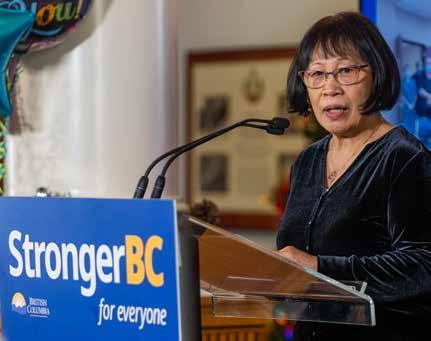
AT LAST | HEU member Cora Mojica spoke at a ceremony at the B.C. Parliament in 2022, where Premier David Eby joined health care workers and MLAs to celebrate the return of more than 4,000 health care workers to the public system.
RECENT HEALTH CARE WORKER GAINS
Since the election of a worker-friendly government in 2017, HEU members have seen some important gains under the BC NDP. HEU worked with government to support many of these advances in health care and labour rights.
Health care improvements
Ended contracting out of housekeeping, food services and other support services jobs by repealing anti-worker legislation passed by the BC Liberals.
Ended contract-flipping in health care by restoring successorship rights (job security) for workers under the Labour Code.
care because they have more job security as public sector workers.
Most importantly, thousands of workers in health care settings like housekeepers, dietary workers, and security guards now feel like they’re part of the health care team. And to me, that’s critical for quality health care delivery.
But I worry about the threats to this historic win. I’m concerned that Kevin Falcon and his party are again talking about how we’ve hired too many new public sector workers, repeating the language they used in the early 2000s when they initiated the largest mass firing of women workers in B.C. history.
We’re expanding the public health care system, while delivering the services more efficiently, so that people don’t have to pay outof-pocket to access these health services. For instance, we’re bringing private surgical and imaging clinics that grew under the previous government back into the public system.
There is still a lot of work to do to repair what Kevin Falcon’s party did to the health care system. But I’m hopeful that our government can continue to build on that work with HEU members in the coming years.
2007
We fought the law (and won!)
HEU wins its legal challenge of Bill 29 The Supreme Court of Canada establishes collective bargaining as a right for all.
2009 Fragmenting seniors’ care
B.C. Liberal government allows long-term care operators to opt out of the facilities collective agreement.
2017 Wave change
BC NDP and Green Party form a government, ending a 16-year B.C. Liberal reign. The next year, they end contractingout of hospital support services.
Wage-levelling stabilized wages in seniors’ care by bringing them up to Facilities Bargaining Association rates. Some workers’ wages increased by $7 an hour overnight.
Reversed privatization by ending 21 commercial contracts at hospitals, bringing more than 4,000 housekeepers and dietary workers back in-house.
The Health Career Access Program (HCAP) trained and hired 7,000 care aides and community health workers within two years.
A historic Facilities Bargaining Association collective agreement included a 14 per cent raise for members, and a process to address wage cuts on pay equity from the early 2000s.
Expanded the reversal of privatization by bringing protection services workers back under health authorities, and providing further training as relational security officers.
$20 million in funding for mental health supports for health care workers in the facilities, community health, and health sciences subsectors.
Labour improvements
Five paid sick days introduced for all workers under Employment Standards Act.
Paid leave for workers who have experienced domestic or sexual violence.
Substantially increased B.C.’s minimum wage, tying future increases to inflation. On June 1, B.C.’s minimum wage will be $17.40 an hour.
Single-step certification (card check) enabled, allowing a union to be certified once 55 per cent of workers sign union cards. HEU was the first union to organize a site using card check.
SPRING 2024 | GUARDIAN 9
LABOUR
Building on bargaining gains
IN recent years, alarming reports of Indigenousbased racism in B.C.’s health care system, along with urgent calls to adopt recommendations by the federal Truth and Reconciliation Commission, have prompted the labour movement to take action.
In many newly negotiated public and private sector collective agreements, there’s a push to revise contract language to be more inclusive and culturally appropriate.
In the 2022-2025 facilities contract, for example, a joint union-employer working group was formed to discuss the damaging impact of colonialism and identify barriers in providing culturally appropriate care. It also aims to create opportunities for training, education and career advancement for Indigenous health care workers.
And new language around recruitment and retention includes additional paid leave days for ceremonial, cultural and spiritual events, an expanded definition of family in accessing bereavement leave, and unpaid leave to run for Indigenous governing bodies.
These gains have been raising the bar for HEU’s private sector contract negotiations. The National Day for Truth and Reconciliation as a statutory holiday, and leave for Indigenous cultural events, is now included in many independent agreements.
Historic breakthroughs
In 1997, health care workers at Nisga’a and Gitxsan workplaces organized to join HEU.
And two years later, a groundbreaking Federal Court of Appeal victory – led by HEU – made it legal for unions to organize, certify and negotiate contracts with First Nations employers.
Today, HEU proudly represents hundreds of Indigenous health care workers in the public and private sectors, including more than 100 members working for the Skidegate (Haida), Nisga’a (Lisims) and Stz’uminus Nations.
VOICES
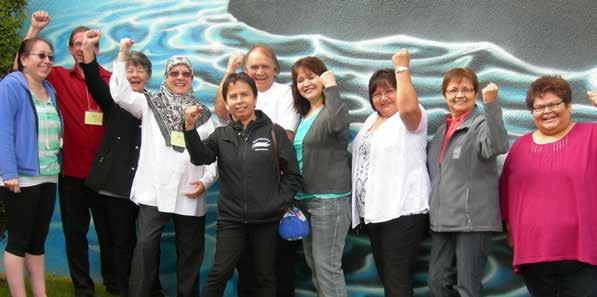
UNION STRONG | Representatives from four First Nations – Nisga’a, Gitxsan (Gitanyow, Gitwangak), Skidegate (Haida) and Stz’uminus – came together to share bargaining ideas and strategies at HEU’s 2013 First Nations Bargaining Conference in Prince Rupert.
Indigenous voices are involved in HEU decision-making, including members of the Indigenous Peoples Standing Committee, the Indigenous Peoples Diversity Vice-President, and HEU Indigenous staff.
Strength in community
The union hosted its inaugural First Nations Bargaining Conference in 2013 in Prince Rupert. Members from four Nations gathered to discuss their shared experiences and unique differences.
In 2018, HEU and a band council collaborated on a first major initiative.
After a nine-month campaign, HEU care aides in Bella Bella won their fight against contracting out at R.W. Large Memorial Hospital – thwarting a Vancouver Coastal Health Authority plan to replace Heiltsuk care aides with LPNs from other health authorities and agencies, most unfamiliar with Heiltsuk culture or Elder care.
In April, more than two dozen HEU mem-
bers working at the XaaydaGa Dlaang Society (Skidegate Health Centre) reached a tentative agreement for a contract renewal, and ratified the contract in May.

HEU dental receptionist Jenna Shelford, of the Haida Nation, was part of the bargaining team. “I am grateful to have served on my first bargaining committee, and now I plan to be involved for many more years – looking out for those who take care of our community at-large.
“This year, I began my journey into the union, and I was mostly learning the ropes. I hope to contribute to the hard work of current and past union members for the collective good, as we strive for the wellness of our peoples and community members and land.”
Inclusion helps support students at school
RECENTLY, there has been confusion and misinformation about what exactly SOGI 123 is and how it’s used in B.C. public schools. As a parent and teacher, I’m hoping to clarify what the resource is, how it shows up in classrooms, and the safe spaces SOGI education produces.
SOGI stands for sexual orientation and gender identity. It is a set of resources that teachers can use to create more inclusive classrooms. SOGI policies in school districts align with the Canadian and B.C. human rights codes which protect against discrimination based on gender and sexual identity and expression.
These resources help teachers prevent bullying, slurs, and create understanding among our students. It’s not a subject that we schedule after math. The goal is to foster a safe learning environment where

The goal of SOGI 123 is to foster a safe learning environment.
all students see themselves and their families.
SOGI education does not replace what parents teach at home. Instead, the resources help teachers support students in making good choices for their physical and mental health as they navigate childhood and adolescence.
When students ask questions about gender or sexuality at school, it’s because they feel those adults are safe and trusted. There can be fear and hesitation among students about how their parents might react. But there is something parents can do: they can make sure that their kids know they are loved and supported no matter what.
News from here and around the world
ROBYN LADNER Grade 7 teacher & SOGI Lead, Vernon B.C.
10 GUARDIAN | SPRING 2024
Jenna Shelford
Brenda Whitehall PHOTO
CAMPAIGNS
Unions call for improved transit
WITH the population of B.C. predicted to soar nearly 50 per cent by 2046, advocates and transit-users are looking at ways to strengthen public transportation.
The Connecting BC report recommends a 10-year plan to make public transit more affordable and sustainable, and to keep it publicly owned and operated,
Co-authored by the B.C. Federation of Labour and the Canadian Centre for Policy Alternatives, the report calls for accelerating Metro Vancouver transit plans, expanding the HandyDart service, and creating a public bus system that connects communities across the province.
Specialized transit
HandyDart, a publicly funded service offering door-to-door, shared transportation for those unable to access conventional buses on their own, has been plagued by long wait times and demand that outstrips its capacity.
Travelling between small communities without a personal vehicle isn’t easy, especially after Greyhound pulled out of many routes.
The ride service is funded by BC Transit and TransLink, but their operations are subcontracted to private companies.
“Over the last few years, TransLink’s HandyDart operations have been in the hands of four different corporations,” explains transit planning consultant Eric Doherty in a report for the Amalgamated Transit Union. This creates instability in the workplace, and as a result, says Doherty, TransLink has failed to attract and retain workers.
In Metro Vancouver, TransLink will send taxis to HandyDart users’ homes when it doesn’t have enough capacity. Last year, 23 per cent of requests were handled by taxi services, whose drivers may have no experience supporting people with disabilities.
The Connecting BC report also calls for increased investment in wages and administration for HandyDart, and expansion of the program into more communities – a move that will increase economic opportunities and better access to health care in small towns, rural areas, and First Nations communities.
Connecting the province
Travelling between small communities in B.C. without a personal vehicle isn’t easy, especially after Greyhound pulled out from many bus routes.
“Getting around B.C. by transit can range from impossible to wildly inconvenient, with multiple fares spanning different public and private operators,” explains the report.
NEWSBITES
New psych unit for North Okanagan
In February, BC NDP Premier David Eby, Health Minister Adrian Dix and Vernon-Monashee MLA Harwinder Sandhu announced plans to construct a new inpatient psychiatric unit at Vernon Jubilee Hospital.
The state-of-the-art, 44-bed unit will provide mental health and substance-use services for North Okanagan residents.
Four of those beds will be allocated for a pediatric psychiatric stabilization unit.
The initiative is projected to improve care and save travel time for patients, caregivers and health care workers by integrating the community-based crisis and hospital services team who currently work at multiple locations.
“It will offer safe and dignified care to more people in crisis,” says Premier Eby. “This is part of our coordinated approach to supporting people who are living with mental health challenges.”
The government expects construction to begin in 2026, with a grand opening in 2029.
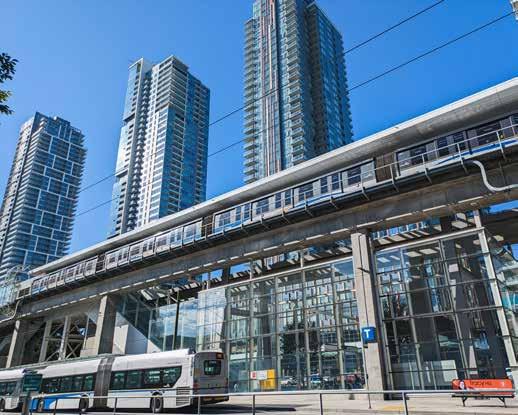
A MOVING VISION | British Columbia’s local transit systems could be united into an upgraded province-wide public transit network, according to new Connecting BC report.
Instead, the report offers a compelling alternative: connect communities through a new provincewide express bus service.
It suggests this could start with three to five round trips per day along key corridors, including filling in transit gaps in northern B.C., and connecting Kelowna, Kamloops and Prince George to Metro Vancouver with express services on fully equipped coach buses.
This would require a fleet of 300 new vehicles, plus new bus stops,
and infrastructure, at an estimated $1.5 billion plus an annual operating subsidy of $100 million.
The report suggests increasing public transit will reduce demand on highways and road infrastructure, and some money could come from funds already earmarked for that budget.
“Imagine being able to get from almost anywhere in B.C. to anywhere else on public transit, as one might in Europe or Asia,” says the report.
Funding boost for community health
The BC NDP government has announced new initiatives aimed at tackling recruitment and retention issues in health care and expanding health services to rural or remote communities.
The Community Bargaining Association, which represents more than 25,000 health care workers, including 2,300 HEU members, will receive another $20 million to fund professional development and mental health and wellness supports for its members.
Incentives for workers living and working in rural and remote communities will increase, up to $8,000 a year for full-time employees.
“We applaud the Ministry of Health’s expanding efforts to support public health care services through the new measures announced today,” said HEU’s interim secretary-business manager Lynn Bueckert.
SPRING 2024 | GUARDIAN 11
Small steps can make big change

IRENE REDDY, an HEU care aide and mental health worker in Metro Vancouver, is no stranger to having political conversations at work.

As a chairperson and shop steward at the Mount St. Joseph local, she is frequently approached by members looking for guidance on who to vote for in union elections.
Knowledgeable and kind, Irene helps members find their answers within.
“You’re going to vote for what’s best for you,” she tells them. “Nobody is
going to make that decision for you.”
Irene was one of more than 50 members who gathered at the Provincial Office in Burnaby on April 12 for the first of 10 “Why Politics Matter” full-day workshops hosted by HEU. The workshops bring members together to explore how electoral politics affect unions and workers.
Irene takes the same common-sense approach to government elections, stressing that doing your own research is the best way to make informed decisions. “Vote for what you believe in and what’s going to be best for you, and go from there,” she urges.
So, where should you begin your research? Irene advises members to “read the collective
NEWSBITES
Voice for the missing Red Dress events raise awareness of missing and murdered Indigenous women, girls, and twospirit people.
HEU members in Prince George collaborated with community and local Indigenous leaders to organize a powerful Red Dress gathering and walk May 5.
Advocates are also calling for the creation of a Red Dress Alert system similar to the “Amber Alert.” To plan an event in your community, check out HEU’s Red Dress toolkit at heu.org/red-dress-toolkit.
agreement, look at HEU’s history, and how the government has impacted where you are as an individual.”
Marilou Gallego, a care aide at Central City Lodge in downtown Vancouver, also attended the workshop, and she echoes this approach.
As lead shop steward and chairperson at her local, she is looking forward to sharing what she learns with her co-workers.
“I want my co-members to be more educated, more engaged, and more knowledgeable,” she says.

Though it may be challenging or uncomfortable, “Nobody – not even your family – should influence your vote,” Marilou says.
With the October provincial election fastapproaching, some HEU members had expressed concern that they did not know how to become involved in politics, or felt as though their vote did not matter. These workshops were created to bridge the gap between desire for change and action.
Marilou sees what she learned as “an opportunity for us to actually educate other members.” With what they take away from workshops, she says, members can start conversations at work that have the opportunity to grow and to support their workplace.
The “Why Politics Matter” workshop series was held during April and May. If you are interested in organizing in your work site or community, please visit heuvotes.ca


B.C. budget big on health care
HEU applauded investments in public health care announced in the February 2024 B.C. provincial budget.
“We know there is more to do to rebuild our system, and this budget keeps us moving in that direction with $13 billion in capital investments in the next three years,” said HEU.
The budget also promised improved home care and community care for seniors, and a commitment to public and non-profit operation of long-term care.
12 GUARDIAN | SPRING 2024
A JOURNEY OF HOPE | HEU member Tammy Gatzke-Meise (left), with Provincial Executive members Lynn Serhan and Louella Vincent, and Shane Cameron from UFCW 1518.
MEMBER EDUCATION
MAKING A DIFFERENCE | More than 400 HEU members in nine communities attended
“Why Politics Matter” workshops in April and May. From first-time voters to seasoned activists, members are looking to make their voices heard.
Thi Vu PHOTO
Irene Reddy
Marilou Gallego
MAÏA SAMPSON
Suzanne Skidmore PHOTO
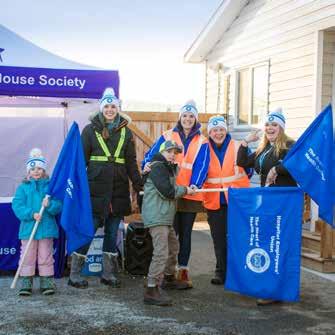
WALKING TOGETHER
HEU’s Quesnel local joined together when one of their sites hosted a “Coldest Night of the Year” walk in February to raise money for people experiencing hurt, hunger and homelessness.
“Our local is so supportive of community events,” says Becky Jaques, Quesnel local vice-chairperson. “It’s great getting together outside of our workplaces and union meetings – and it’s even better when we can raise money for a good cause.”
The Quesnel local covers two sites: G.R. Baker Memorial Hospital and Amata Transition House. The walk, organized to benefit Amata, was sponsored by the local, who also hosted a Care Can’t Wait table at the event.
Jaques says the Quesnel community widely supported the walk, with teams collecting pledges and completing either the two or five-kilometre route.
“Our local tabled at the event and had a team participating in the walk,” says Jaques. “We were Spill-the-Tea, and our 12-member team raised over $1,000 through pledges.”
In total, $10,000 was raised for Amata Transition House’s Indigenous Relief Fund, which supports Indigenous women and their children who are escaping violence.
HEU member Dennise Velasco survived illegal arrest and imprisonment in the Philippines for his human rights activism and union organizing
Repression and resilience
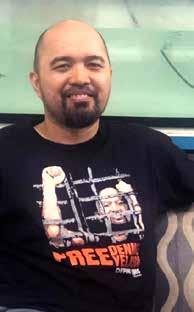
AFTER THE SHIFT
Walking to school in an area known as “strike city” in Metro Manila, Dennise Velasco observed the injustices Filipino workers faced – meagre wages, job insecurity, government threats and oppression, union-busting, and perennial picket lines.
“My labour activism was deeply rooted in my working-class background and experiences growing up,” says Velasco, a union organizer and campaign officer, who championed affordable education, democracy, and workers’ rights in the Philippines.
But the longtime activist’s world turned upside down on December 10, 2020 – ironically, International Human Rights Day – when state police illegally raided his home. They forced his family to lie face down on the ground, planted firearms and explosives, and arrested Velasco.
“I realized early on that I would be subjected to military and police surveillance because of my involvement in the labour movement,” says Velasco, a new HEU member.
“Many of my activist trade union colleagues have been killed, forcibly disappeared, or arbitrarily arrested on trumped-up charges based on false testimony and fabricated evidence.”
That terrifying night, Velasco says, state forces arrested six trade union organizers and one journalist – who became known as the “Human Rights Day Seven.” Four of those activists remain behind bars.
“There are almost 800 political prisoners in jails across the Philippines,” says Velasco. “The system is so corrupt that the government can use all its resources just to silence activists.”
But in March 2022, a court ruled Velasco’s constitutional rights had been violated, and he was released after 15 months in prison.
“I’m proud to be an HEU activist. And I remain committed to defending human rights and advocating for social justice.”
Velasco credits campaigns by international labour organizations, social justice and human rights groups, and brave activists in the Philippines for freeing him – including support from Canada.
Shortly after moving to B.C., Velasco began working for The Bloom Group as a tenant relations worker at Cordova House.
“I’m proud to be an HEU activist,” says Velasco. “I believe standing in solidarity with co-workers and getting engaged with the local union empowers workers. And I remain committed to defending human rights and advocating for social justice.”
BRENDA WHITEHALL
Regional meetings held
Several hundred members attended HEU’s spring regional meetings held in Victoria, Prince George, Kelowna, Surrey and New Westminster.
Regional meetings are organized each year to update members on the union’s activities, and to hear about any issues or concerns.
Participants also make recommendations on how the union can better support locals.
The Provincial Executive’s regional vice-presidents were an integral part of these meetings, which included reports by
president Barb Nederpel, financial secretary Betty Valenzuela, and interim secretary-business manager Lynn Bueckert.
Guest speakers, including some BC NDP MLAs and cabinet ministers, discussed the upcoming provincial election on October 19.
The union’s communications and research departments hosted political action workshops to teach and encourage members to get involved in local campaigns.
Any HEU member can apply for union leave to attend these twoday meetings.

SPRING 2024 | GUARDIAN 13
ALL FUN AND GAMES | Members at the Fraser regional meeting tested their knowledge of HEU history in a Family Feud-inspired game.
Kim Bellevance PHOTO
COFFEE BREAK

How it all began
HEU turns 80 years old on October 13, 2024. How well do you know your union’s early history?
1
2
What facility is recognized as the founding HEU local?
a) Prince George Regional Hospital
b) Royal Jubilee Hospital
c) Vancouver General Hospital
d) 100 Mile District General Hospital
In 1936, a Lower Mainland hospital began collecting monthly union dues in the following amount?
a) 25 cents c) $25
b) $2.50 d) $250
3 4 5
The Guardian, HEU’s flagship magazine, was first published as a newsletter in?
a) 1944 c) 1960
b) 1954 d) 1950
HEU’s first biennial convention was held in what year?
a) 1945 c) 1965
b) 1958 d) 1968
In what year did HEU bargain employerpaid medical coverage, pension and superannuation plans, accumulative sick leave, and holiday pay?
a) 1956 c) 1994
b) 1936 d) 1970
HEU MEMBERS:
Send us your answers to be entered to win a prize!
Go to heu.org/coffeebreak and submit your answer online by July 30, 2024.
Answers: c, a, d, b, a
The job of the shop steward is to defend your collective agreement rights in the workplace. Earlier this month, HEU members from independent locals attended workshops at our Provincial Office for a deep dive into their collective agreements and a chance to share their knowledge.

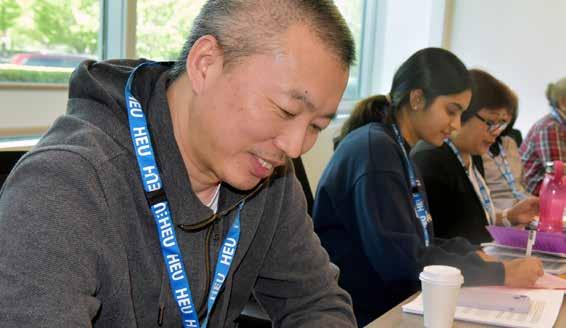
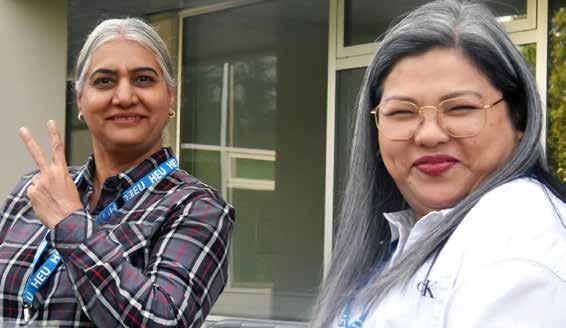
14 GUARDIAN | SPRING/SPRING 2018
SPRING 2024
Steward Kirpal Bhangoo, a housekeeper from Langley Seniors Village, and care aide Cristina Parilla, secretary-treasurer at her Crofton Manor local, share a fun moment during the workshop.
Catalina Catacutan — lead steward and local chair at Madison Care Centre — and Mimi Bravo from Carlton Gardens both work as care aides.
Paul Li is a steward at Amica White Rock, where he works as a cook.
Thi Vu PHOTOS
HEU PEOPLE
RETIREMENTS

Long-time HEU activist Tina Clemente retired in March after more than 20 years at UBC Hospital and then GF Strong as a nursing unit clerk.
Tina was her local chair, shop steward, JOHS committee worker rep, and member of the DEI working project.
She has served on many committees, including the P.E. clerical subcommittee, Pink Triangle, and People with Disabilities. Tina received the HEU Disability Rights Award at the union’s 2021 convention.
“I really enjoyed working in rehab, seeing the progress of recovery for the patients and so many successes,” recalls Tina. “I was very fortunate to be seen as an integral part of the team.”
Tina says her retirement plans include travelling, gardening, home renos, and courses at the local university. “I also want to join a retired activist group because once an activist, always an activist.”

After 37 years at Interior Health, Loreen Davies is retiring in August. She worked 22 years at Ashcroft Hospital as an admitting clerk, receptionist, and cashier, and has spent the last 15 years working in accounts receivable at Royal Inland Hospital.
Active in the union, Loreen held multiple local positions, including treasurer, warden, conductor, and trustee.
“I enjoyed the fellowship of great co-workers, the patients we helped, and the challenges of the job,” says Loreen.
“Although I’m ready to retire, I tear up at the thought of not seeing my co-workers every day. They are family.”
In retirement, Loreen plans to spend time at her trailer; visit family in Germany, England and Wales; read, and dabble in watercolours.

Payroll clerk Janet King retired from Royal Columbian Hospital in April, after 30 years of service.
“I enjoyed talking to, and helping, fellow employees,” says Janet. “I was lucky to have a variety of jobs, and was often able to work independently without supervision. I will miss my routine, my colleagues, and helping others.”
In retirement, Janet plans to explore new hobbies, volunteer, travel, and spend time with family and friends.
Recently retired from Burnaby Hospital, Joe Kynock spent 25 years working as a porter, maintenance worker, and patient ambassador.
He held many local positions, including chair, vice-chair, and shop steward.
“Joe has a great sense of humour, and always gets any job done,” says a co-worker. “We will miss his enthusiasm and dedication to seeing his co-workers being respected.”
“I will miss the people, my brothers and
60,000 members in 296 locals
sisters working together for the betterment of all patients,” says Joe. “I enjoyed ensuring that my co-workers were well-represented, and the collective agreement was protected.”
In retirement, Joe plans to stay active and play more music with his band.

Retired in April, Elaine McQuade worked as an LPN at Stanford Seniors Village for 11 years.
Elaine served her local as chair and shop steward. She was also part of the bargaining team, attended several conventions and workshops, and participated in HEU summer school.
“I loved building relationships with residents and my co-workers,” says Elaine. “I will miss nursing and working with my co-workers, taking workshops at HEU, and meeting other health care workers from all over the province.”
In retirement, Elaine plans to be active with her grandchildren, kayaking, paddle boarding, and hiking with her dogs.

After 40 years of service, counsellor Trish Nobile retired from the Salt Spring Island Community Services Society last November.
Trish was her local chair, and played an instrumental role in the creation of the Core Inn Youth Project Society. Through robust community fundraising, the Society was able to purchase a building that became the Core Inn Youth Centre. Trish was their coordinator until the Society amalgamated with Island Community Services in 2007.
Trish’s love of music and entertainment has led to her involvement with many local groups and festivals, including Salt Spring Festival of the Arts and the Salt Spring Island Folk Club.
IN MEMORIAM

Sadly, 23-year-old Tori Vales passed away suddenly in January. She worked as a clerk for the Vancouver Cancer Centre in Health Information Management.
Always optimistic, Tori was fearless, growing, and finding her way. She had the ability to bring everyone together, and will be remembered for her kindness.
An avid reader, Tori loved spending time with her family and friends, enjoying the outdoors, socializing, and trying new hobbies.
“Tori was an exceptional colleague and friend, brightening our workplace with her daily smiles,” says a co-worker. “Her attention to detail with such care and thoughtfulness made anyone feel special. Tori will be deeply missed.”
Equity matters
Did you know that HEU has six equity standing committees? Working with HEU’s equity officer, they provide outreach and advocacy to HEU members, and work in solidarity with other social justice groups.
To learn more, call 1.800.663.5813 to speak with HEU’s equity officer Lennie Dolinski.
Ethnic Diversity • Indigenous Peoples Pink Triangle • People with Disabilities • 2-Spirit, Women and Non-Binary • Young Workers
“In
EDITOR
Neil Monckton
MANAGING EDITOR
Elaine Littmann
ASSOCIATE EDITOR
Brenda Whitehall
GRAPHIC DESIGNER
Elaine Happer
PRINTING
Mitchell Press
PROVINCIAL EXECUTIVE
BARB NEDERPEL
President
LYNN BUECKERT
Secretary-Business Manager (Interim)
BETTY VALENZUELA
Financial Secretary
BILL MCMULLAN 1st Vice-President
CHARLOTTE MILLINGTON 2nd Vice-President
DONOVAN ADLAM 3rd Vice-President
TALITHA DEKKER
Senior Trustee
CHRIS BATTING
Senior Trustee-Elect
OLIVIA BURGON
Trustee
BONNIE HAMMERMEISTER
Regional Vice-President
Fraser
SCOTT MCKAY
Regional Vice-President
Fraser
DIANE TOMEI
Regional Vice-President
Fraser
BALJIT SANDHU
Regional Vice-President
Interior
MONICA THIESSEN
Regional Vice-President
Interior
BARB SHUKIN
Regional Vice-President
Interior
ANGELA SHARF
Regional Vice-President
North
LISA CREMA
Regional Vice-President
North
LOUELLA VINCENT
Regional Vice-President
Vancouver Coastal
MARIA LUGS
Regional Vice-President
IAN SMITH
Regional Vice-President
Vancouver Island
PHIL HENDERSON
Regional Vice-President
Vancouver Island
LYNN SERHAN
Diversity Vice-President
Indigenous Peoples
CORA MOJICA
Diversity Vice-President
Ethnic Diversity
DARLENE BOWN Diversity Vice-President
Pink Triangle
LISA KREUT
Diversity Vice-President 2-Spirit, Women and Non-Binary
CHRISTINE EDGECOMBE
Diversity Vice-President People with Disabilities
SEYDA YALCIN Diversity Vice-President
Young Workers
HEU OFFICES
PROVINCIAL OFFICE
5000 North Fraser Way Burnaby V5J 5M3 604-438-5000 1-800-663-5813
EMAIL heu@heu.org
WEB www.heu.org
REGIONAL OFFICES
Vancouver Island
VICTORIA 201-780 Tolmie Avenue Victoria, V8X 3W4 250-480-0533
1-800-742-8001
COMOX 6-204 North Island Highway Courtenay, V9N 3P1 250-331-0368 1-800-624-9940
Interior
KELOWNA 250-1815 Kirschner Road Kelowna, V1Y 4N7 250-765-8838 1-800-219-9699
NELSON 745 Baker St. Nelson, V1L 4J5 250-354-4466 1-800-437-9877
MOVED? Please notify us of your change of address online: www.heu.org/change-contact-information
Vancouver Coastal
KAREN MCVEIGH
Regional Vice-President
Vancouver Coastal
Northern PRINCE GEORGE 1197 Third Ave. Prince George, V2L 3E4 250-564-2102
1-800-663-6539
HEU is a member of the Canadian Association
SPRING 2024 | GUARDIAN 15
of Labour Media
humble dedication to all those who toil to live.”
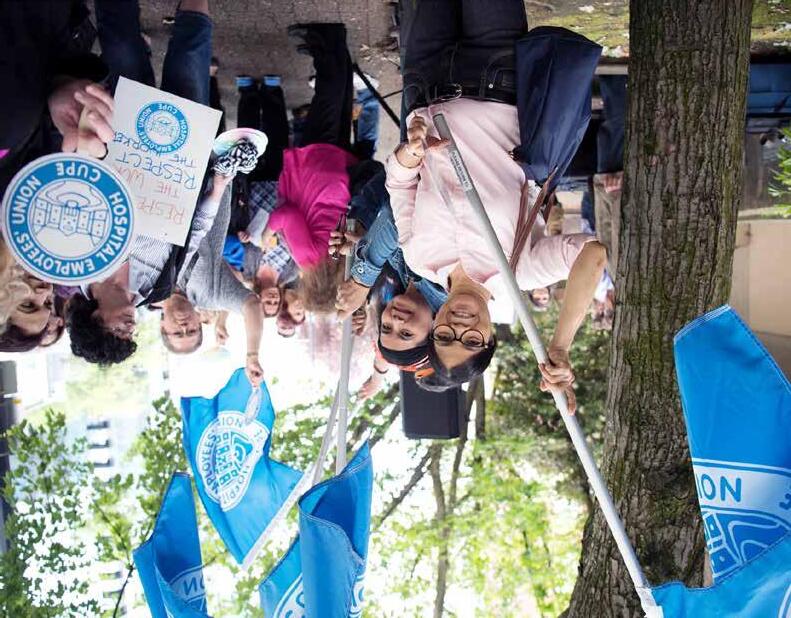
HEU VOTES
RETURN TO The Guardian 5000 North Fraser Way Burnaby, B.C. V5J 5M3 AGREEMENT NUMBER 40007486
Your vote counts. This October 19, help elect a B.C. government that is committed to improving wages, benefits and working conditions and better health care for everyone. Find out more at heuvotes.ca








 BRENDA WHITEHALL
BRENDA WHITEHALL





 Barb Nederpel | President
Barb Nederpel | President





























